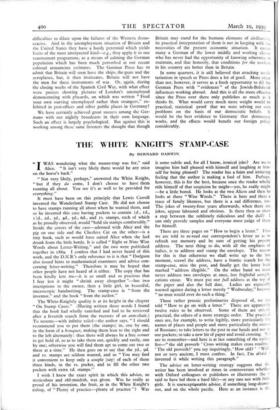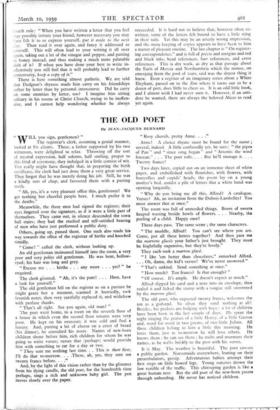THE WHITE KNIGHT'S STAMP-CASE
By BERNARD DARWIN
" y WAS wondering what the mouse-trap was for," said Alice. "It isn't very likely there would be any mice on the horse's back."
"Not very likely, perhaps," answered the White Knight, "but if they do come, I don't choose to have them running all about. You see it's as well to be provided for everything."
It must have been on this principle that Lewis Carroll invented the Wonderland Stamp Case. He did not choose to have stamps running all about when he wanted them, and so he invented this case having pockets to contain id., id., 'Id., ad., 3d., 4d., 5d., 6d., and is. stamps, each of which as he proudly observed, would "hold six stamps comfortably." Inside the covers of the case—adorned with Alice and the pig on one side and the Cheshire Cat on the other—is a tiny book, such as would have suited Alice when she had drunk from the little bottle. It is called "Eight or Nine Wise Words about Letter-Writing," and the two were published together in 1889. I confess that I had never heard of this work, and the D.N.B.'s only reference to it is that " Dodgson also issued hints to mathematical examiners and advice con- cerning letter-writing." Therefore it may be hoped that other people have not heard of it either. The copy that has been kindly lent me—it is so small and so precious that I fear lest it might "shrink away altogether "—has two inscriptions to the owner, then a little girl, in beautiful, microscopic handwriting. The stamp-case is "from the inventor," and the book "from the author."
The White-Knightly quality is at its height in the chapter "On Stamp Cases." (Having written those words I found that the book had wholly vanished and had to be retrieved after a feverish search from the recesses of an arm-chair.) To resume—with infinite relief—the author says, "I should recommend you to put them (the stamps) in, one by one, in the form of a bouquet, making them lean to the right and to the left alternately: thus there will always be a free corner to get hold of, so as to take them out, quickly and easily, one by one; otherwise you will find them apt to come out two or three at a time." He then goes on to say that the id., 9d. and is. stamps are seldom wanted, and so "You may find it convenient to keep only a couple (say) of each of these three kinds, in the is. pocket, and to fill the other two pockets with extra id. stamps."
I wish I knew the exact spirit in which this advice, so meticulous and old-maidish, was given. Was he really as proud of his invention, the fruit, as in the White Knight's riding, of "Plenty of practice—plenty of practice "? Was it some subtle and, for all I know, ironical joke? Are we to imagine him half pleased with himself and laughing at him- self for being pleased? The reader has a faint and irritating feeling that the author is making a fool of him. Perhaps, however, this is for the best, because once the reader wholly rids himself of that suspicion he might—yes, he really might —be a little bored. He looks at the two Alices and then he looks at these "Wise Words." There is here and there a trace of family likeness, but there is a sad difference, too. The jokes of twenty-four years afterwards, when there are jokes, appear laboured and obvious. Is there then so short a step between the sublimely ridiculous and the dull? I can only provide samples and everyone must judge of them for himself.
There are three pages on "How to begin a letter." First we are told to re-read our correspondent's letter so as to refresh our memory and be sure of getting his present address. The next thing to do, with all the emphasis of italics, is to address and stamp the envelope. The reason for this is that otherwise we shall write up to the last moment, scrawl the address, have a frantic search for the stamp-case, miss the post, and finally get the letter back marked "address illegible." On the other hand we must never address two envelopes at once, lest frightful compli- cations ensue. We must put our full address at the top of the paper and also the full date. Ladies are especially warned against dating a letter merely "Wednesday," because "no man would ever do such a thing."
These rather prosaic preliminaries disposed of, we are told "How to go on with a letter." There are apparently twelve rules to be observed. Some of them are strictly practical, the others of a more strategic order. The practical ones are, for example, to write legibly, more particularly the names of places and people and more particularly the names of Russians; to take letters to the post in our hands and not in our pockets; to take a new bit of paper and avoid crossing. Vs c are to remember—and here is at last something of the earlicr fire—" the old proverb 'Cross writing makes cross reading.' 'The old proverb?' you say inquiringly, How old?' Well not so very ancient, I must confess. In fact, I'm afraid invented it while writing this paragraph."
The advice on letter-writing strategy suggests that the writer has been involved at times in controversies whether with Oxford colleagues or publishers or illustrators (he said to have led them a hard life)—at any rate not with link girls. It is unexceptipnable advice, if something long-drawn- out, and on the whole pacific. Here as an instance is the iurth rule: "When you have written a letter that you feel ,av possibly irritate your friend, however necessary you may ve felt it to so express yourself, put it aside to the next „ay. Then read it over again, and fancy it addressed to ourself. This will often lead to your writing it all over again, taking out a lot of the vinegar and pepper, and putting in honey instead, and thus making a much more palatable dish of it! If when you have done your best to write in- offensively you still feel that it will probably lead to further controversy, keep a copy of it."
There is here something almost pathetic. We are told that Dodgson's shyness made him carry on his friendships rather by letter than by personal intercourse. Did he carry on some enmities by letter, too? I imagine him sitting solitary in his rooms at Christ Church, trying to be inoffen- sive, and I cannot help wondering whether he always succeeded. It is hard not to believe that, however often re- written, some of the letters felt bound to have a little sting in their tails. Yet this may be an utterly wrong impression, and the mere keeping of copies appears to have been to him a matter of pleasant routine. The last chapter is " On register- ing correspondence," and is full of précis and margins and red and black inks, head references, foot. references, and cross references. This is dry work, as dry as that passage about the Earls of Mercia and Northumbria which the mouse, on emerging from the pool of tears, said was the dryest thing it knew. Even a register of an imaginary series about a White Elephant, passed on to the Zoo where it turns out to be a dozen of port, does little to cheer us. It is an odd little boot, and I almost wish I had never seen it. However, if an anti- dote be wanted, there are always the beloved Alices to read yet again.











































 Previous page
Previous page